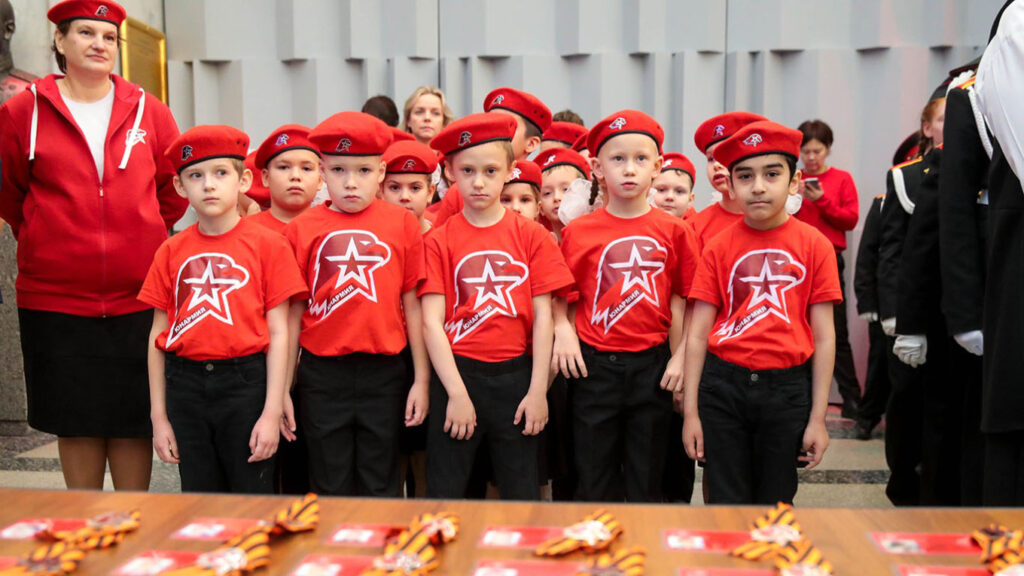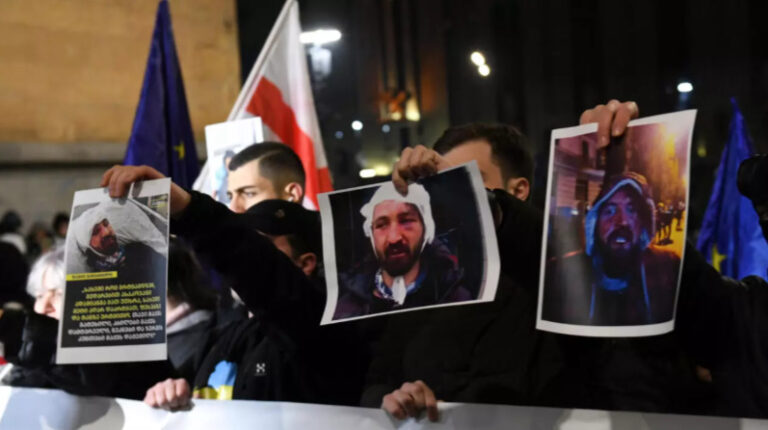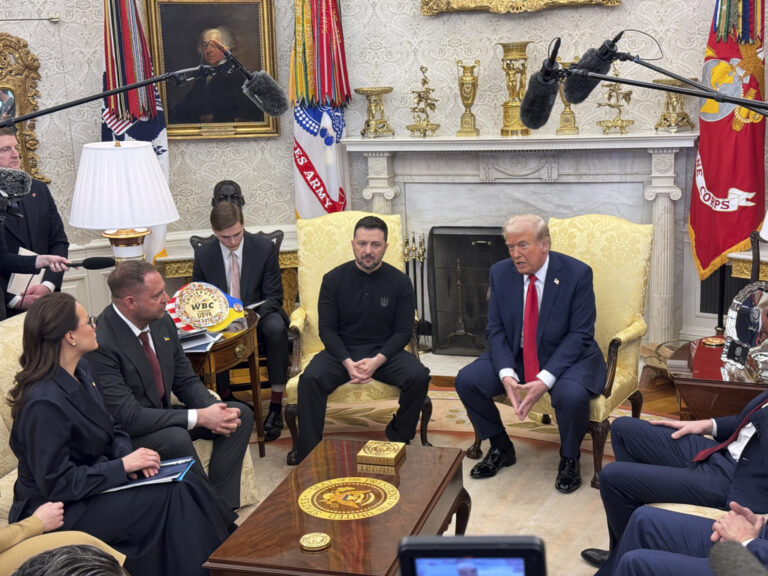
On April 21, 2025, the British Ministry of Defense released an intelligence report stating that “The Russian education system is highly likely becoming increasingly politicised, militarised and ideologically driven in accordance with the Russian state’s broader objectives.” Citing the media outlet Verstka, the report highlights a troubling uptick in educational materials championing the so-called “special military operation” in Ukraine, spreading anti-Western sentiments, and resurrecting Soviet-era literature alongside an array of patriotic and pro-Russian military narratives.
These findings indicate the dangers of Russia’s increasingly militarized and politicized education system, an issue that we must all pay attention to. Over the past few decades, the Russian education system has been shaped into an instrument of brainwashing, meticulously designed to indoctrinate the youth of Russia by aligning them with the Kremlin’s fervent nationalist and imperialist ambitions. This educational framework poses a grave threat, cultivating a generation primed to execute the militaristic and nationalistic objectives set forth by Russian authorities. Such developments represent a substantial threat not only to the stability of Europe but also to the sovereignty of neighboring nations — like Ukraine and Georgia — who have already felt the harrowing impacts of Russian aggression.
British intelligence posits that this shift is almost certainly aimed at bolstering domestic support for Russia’s war in Ukraine while simultaneously fostering a deeper commitment among the youth to enlist in the face of significant military setbacks. Furthermore, the report warns that this newly politicized and militarized form of education threatens to entrench a brand of aggressive, expansionist Russian nationalism for generations to come.
In a manner reminiscent of the totalitarian regimes of Nazi Germany and the Soviet Union, the educational system in Russia serves as a powerful instrument for embedding the values espoused by the Kremlin within the minds of the nation’s youth. It ensures their compliance and readiness to fulfill their prescribed roles within an authoritarian, militarized, and nationalistic society — one that is increasingly devoid of democratic ideals and free thought. Under the aegis of Vladimir Putin, who has strategically shaped Russian society to align with his vision, education stands as one of the most potent means of sculpting the collective consciousness of the populace.
Russian youth are indoctrinated with a narrative steeped in state-sanctioned disinformation. Their textbooks describe a rendition of history that glorifies Russia’s endeavors while vilifying its so-called adversaries, who are painted as existential threats. These educational tomes extol the virtues of a “just” war against a purportedly neo-Nazi Ukraine, decry the machinations of the malevolent NATO, and frame the 2014 upheaval in Kyiv as a coup instigated by Western intelligence. They herald the “Russian Spring,” a period marked by grand elections that beckoned Moscow’s intervention. Central to this curriculum is the reverent recounting of the WWII, termed the Great Patriotic War, which focuses on the “genocide of the Soviet people.”
Historians, handpicked by the Kremlin, have meticulously crafted this history, emphasizing the valiant defense of the homeland, the tribulations of the Soviet nation, and the supposed heroics of the Russian Spring and the Special Military Operation. Such narratives, woven into the fabric of Russia’s education system, aim to validate the state’s actions and cast Moscow as a beleaguered fortress, ever under siege.
Very little emphasis is placed on critical thinking in Russian public schools and universities. The dominant teaching approach consists of lecturing from the textbook from A to Z, with the expectation that students will regurgitate information on tests without voicing their opinions or expressing any opposition to the official narrative presented to them.
In a calculated effort to instill a sense of martial duty from an early age, Russian children are being groomed as future defenders of the motherland, perpetually vigilant against perceived threats. Take, for instance, the schools in the Russian republic of Chuvashia, where students are equipped with replicas of grenades, Kalashnikov rifles, and Makarov pistols. Similarly, the Kremlin has fostered the rise of militaristic youth organizations like Yunarmia, particularly prominent in the annexed territories of Ukraine, such as Crimea. Here, young recruits, some as young as eight years old, can enlist by simply completing a questionnaire via a mobile application, thereby stepping into a world where they are conditioned to view Ukraine as an adversary.
To further entrench patriotic fervor, the Kremlin has launched the “Roads of Victory” initiative, which offers complimentary excursions to sites steeped in military and historical significance. In tandem, President Putin has mandated the expansion of “military-sports camps” and the creation of platforms dedicated to youth-centric military-patriotic education.
In recent years, Russia has also reintroduced a curriculum steeped in “traditional” and “patriotic” values, prominently featuring the mandated study of religious education. This subject made its debut in Russian classrooms in 2012, permitting optional coursework on Eastern Orthodoxy, Islam, Buddhism, Judaism, and other world religions. However, the reality for students often diverged sharply from this promised variety; teachers frequently dictated the choice, leading to a predominance of Orthodox culture in the curriculum. Even in instances where students nominally had the option to choose Secular Ethics, this module was often supplanted by Orthodox teachings.
The enduring repercussions of Russia’s militaristic and ostensibly “patriotic” approach to education manifest in the brainwashing of its youth. Rather than nurturing a generation of specialists poised to advance the nation, this indoctrination serves only to funnel them into military service, perpetuating the Kremlin’s imperialist ambitions. The alarming decline in young people pursuing higher education signals a troubling degradation in the cultivation of new talent. Consequently, many of Russia’s technological sectors face inevitable decline, exacerbated by a shrinking workforce and the punitive effects of Western sanctions already crippling the industry. Meanwhile, the Kremlin’s strategic curtailment of access to higher education, coupled with an emphasis on vocational training, factory labor, and, most critically, military enlistment, reveals a deliberate intent to mold a populace more suited for servitude than innovation.
Even those who manage to enter the halls of higher education in Russia find themselves ensnared by a network of mobilization and military training initiatives orchestrated by the Kremlin. This systematic indoctrination of the nation’s youth through the educational system reflects the ambitions of Putin and his cohorts to mold Russia into a militaristic society perpetually poised for conflict. This endeavor has been a relentless pursuit since the disintegration of the Soviet Union, evident in the brutal conflicts that emerged in Chechnya during the 1990s, the incursion into Georgia in 2008, and the ongoing crisis in Ukraine, which escalated dramatically with Russia’s full-scale invasion in 2022.
As the younger generation is groomed to embrace their roles as warriors, this aggressive and nationalistic approach to education not only stifles Russia’s potential for growth but also warrants serious concern from the global community. The long-term implications of this militaristic indoctrination pose a significant threat to international stability and security as Russia continues to engage in conflicts across the globe.
The Zeitgeist aims to publish ideas worth discussing. The views presented are solely those of the writer and do not necessarily reflect the views of the editorial board.



